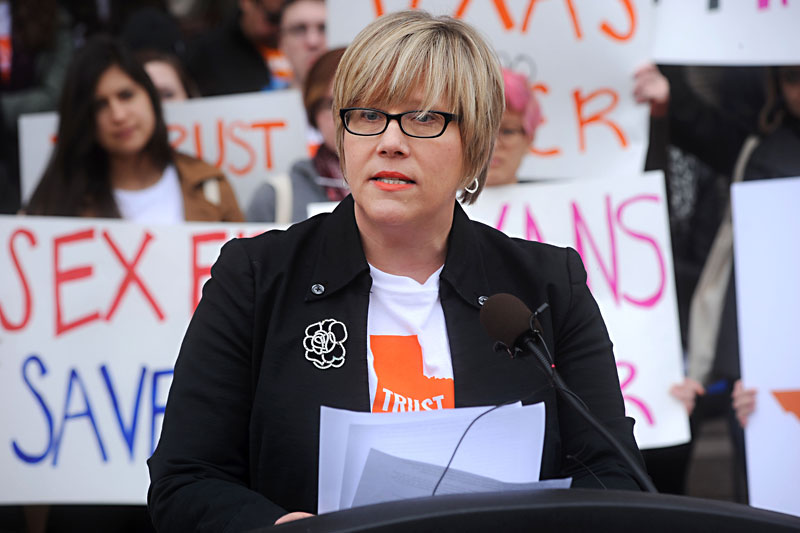Texas Abortion Advocates on What Happens Next
Texans once again have an unfortunate head start in having their rights stripped away
By Maggie Q. Thompson, Fri., May 6, 2022

Advocates and court watchers are not surprised that the U.S. Supreme Court, in a draft ruling that leaked to the press earlier this week, is prepared to overturn the 1973 Roe v. Wade decision in full, and free the various states to ban abortion care. The collapse of the Roe framework for reproductive rights has been in the offing for months if not years, and Texans once again have an unfortunate head start.
"The vast majority of people in this country are pro-choice, but they're silent and they let the minority of people against abortion take up the space," said Amy Hagstrom Miller, president of Austin-based Whole Woman's Health, to the Chronicle. Data backs her up: Gallup polling in 2021 found that 4 of 5 Americans think abortion should be legal in some or all circumstances, a number that's barely budged since the mid-1970s. Results from an April UT-Austin survey found only 15% of Texans support a total ban.
The Supreme Court heard arguments in December in the Mississippi case, Dobbs v. Jackson Women's Health Organization, which has provided its five anti-choice right-wing justices – three appointed by Donald Trump – an occasion to throw out Roe and its 1992 follow-up, Casey v. Planned Parenthood. Several months earlier, Texas had enacted an abortion ban (as Senate Bill 8) that was even more restrictive than the Mississippi statute, and was able to evade legal challenges to it even as Roe remained in effect. This did not result in an uprising of angry Texans; instead, abortion funds in the state have budgeted to fly people even farther away for care, and nonprofits such as Aid Access have been sending more semi-contraband abortion pills to Texans than ever before.
In March, the U.S. House of Representatives passed the Women's Health Protection Act (H.R. 3755, by Judy Chu, D-Calif.) to write Roe v. Wade's protections into law, but the measure failed to gain the 60 votes needed in the Senate to clear a GOP filibuster (read more). House Speaker Nancy Pelosi, on her most recent visit to Austin March 22, conceded she had no hope that the current Senate will ever pass legislation protecting abortion rights. She did see hope in the power of public sentiment – "when families, not just women, but women and families, weigh in about the injustice of it all."
So what options are left? The Chronicle reached out to those on the front lines in Texas, and they echoed a similar message: We can't do this alone. It's going to take a massive national movement. If the only participants are people who expect they might soon need an abortion themselves, the movement will fail. And if it does, our notions of how constitutional rights are supposed to work will fail as well.
No One Is Coming to Save Us
"Oh wow. Well, I guess I have to talk about my mother."
This is Elisa Wells – founder of Plan C, which provides support and resources for medication abortion – on why she's dedicated her career to increasing access to abortion care. Her mother went to a gynecologist in Connecticut in 1955 as a newlywed to get fitted for a diaphragm, but learned that it was illegal to obtain birth control in the state. (The Supreme Court in 1965 threw out that law and, in the process, first articulated a constitutional right to privacy that would later undergird Roe.)
"[My mother] was like, basically, what the fuck? So she went and found Planned Parenthood in New York, they fitted her, and she was able to plan her family. My brother was born five years later. And so that made her a lifelong supporter and outspoken advocate for women's rights and reproductive rights."
And that's the thing. Elisa Wells is no longer of childbearing age, and she said she has never expected that the right to abortion care would be peacefully accepted in her lifetime. Her battle has always been one to span generations. "We're far from done in the fight for this. … When you look at who [banning abortion] affects – already underserved people, poor, rural, people of color – it's no big surprise. This is part of a larger system of injustice and inequity that exists in our country."
Wells' mother's story illustrates another important point that attorneys such as Marc Hearron, senior counsel at the Center for Reproductive Rights, want to hammer home: Americans can no longer rely on the courts to eventually rally to defend their freedoms. "For a long time, people have depended on litigation as a solution to combat reckless and harmful things that politicians do, laws that attack individual rights and liberties," Hearron told the Chronicle. "What we're seeing now is a real restriction, I think, on the federal court's willingness to step in to protect individual liberties. … It's now in the hands of political actors."
In November, Hearron argued Whole Woman's Health v. Jackson before the Supreme Court – the legal challenge of Texas' SB 8, brought by Hagstrom Miller and other providers and advocates. A month later, the high court threw out most of the Center for Reproductive Rights' case, and Hearron expected the court would also overturn Roe once the time came. At that point, trigger laws in 13 states, including Texas, will automatically outlaw abortion in almost all circumstances.
Hearron points out that the Supreme Court's complacency around SB 8 not only foreshadowed the end of Roe, but also pulled a crucial thread that could unravel protections for other rights as well. The Texas law's bounty-hunter provisions, which give private citizens the right to harass people with civil lawsuits who "aid or abet" an abortion, lay the groundwork for lawmakers to nullify other unpopular but protected rights, which would differ from state to state. "It's hijacking the courts to be used as a means of creating so much fear that it chills and precludes the exercise of constitutional rights."
So We Save Ourselves
When the Roe framework finally disintegrates, Texans who can afford to travel out of state for an abortion, whether to the nearest blue states (New Mexico and Colorado) or to another country, will have ready access to reproductive health care. Poor people will not. Those who need help covering the costs of not only doctors' visits and medications but travel and lodging can get support from groups such as Fund Texas Choice, Lilith Fund, and the Texas Equal Access Fund, which all help pay for abortion-related expenses. All of these support funds have likewise been in legal jeopardy since SB 8 was passed.
One thing that has genuinely, definitively improved since before Roe is the safety and success of abortion care itself. More than half of all abortions performed in America involve simply taking two pills – mifepristone and misoprostol – under the supervision of a provider who may be seeing the patient remotely. Increasingly, people are ordering supplies of these pills to keep on hand should they need them. Texas has unsurprisingly outlawed telehealth abortions, but the nonprofit Aid Access, led by an Austrian doctor who is beyond the state's reach, offers remote appointments and prescriptions. Prior to SB 8, Aid Access received about 11 requests for pills per day from Texas. When the law took effect September 1, requests jumped to roughly 138 per day, and later stabilized at around 37 per day.
The organization Wells co-directs, Plan C, conducts research and publishes reports on how patients access abortion pills; many are ordering them directly from online overseas pharmacies that don't require prescriptions. (Misoprostol is sold over the counter in Mexico as a treatment for ulcers.) Researchers at Plan C have vetted many of these online pharmacies by ordering and then testing the pills for quality.
Plan C researchers are also seeing more people using mail forwarding services to have pills delivered to addresses in states that allow abortion. After a person rents a mailing address from a service such as Anytime Mailbox to use for their telemedicine consultation, they ask the service to forward the package to their home address.
However, some pregnancy care needs go beyond the scope of telehealth, said Jaylynn Farr Munson of Lilith Fund. "Abortion pills are good and I plan on having some at hand at some point. But people need to be able to get in-clinic care with a provider in their community when they want to. [Abortion pills are] going to be a kind of solution for some people. It answers the question of travel and cost for some people, but not for others."
Hagstrom Miller points out that for 50 years, much of the U.S. population has taken access to abortion for granted; nearly two-thirds of Americans were born in the Roe era. Moreover, while much attention is paid to hypothetical abortions in the event of a crisis – rape, incest, life-threatening health issues – it is a common medical procedure performed in the U.S. about 2,500 times a day. A 2017 study from the Guttmacher Institute found that nearly 1 in 4 American women (23.7%) will have an abortion by age 45.
Despite that, Hagstrom Miller says, most of those who seek abortion care at Whole Woman's Health believe they are the only person they know to have aborted a pregnancy. "I think it's important for people to talk about the value that access to safe abortion offers, not only talking about the framework of survival or tragedy," she said. "Many men and women have been able to plan their lives. That makes it a little more personal. … To know that you could if you needed to, that's how multiple generations of people in this country have lived their lives [till] now."
Got something to say on the subject? Send a letter to the editor.
Read more of the Chronicle's decades of reproductive rights reporting here.









